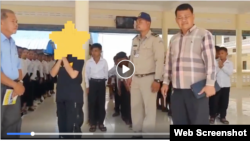Kampot police officials on Wednesday made an underage student publicly apologize for allegedly spreading fake news in a private Facebook audio message, with police officials not revealing how they accessed her private texts.
The girl, who studies in a school in Kompong Trach district, was made to publicly apologize in a video, which was then published on Facebook by the provincial and district police, where she is made to reveal her name and address.
The girl’s alleged crime was sending a private audio message saying there were three people sick with COVID-19 in the school and three others had died from the disease. But these were sent on private chats and it was unclear how the police accessed them.
"I would like to point out to all the people on Facebook that this school has no coronavirus. So, I am sorry. This information that I talked about yesterday wasn't true," she is heard saying in the video, in the presence of police officers, school officials and other students.
A post on the Kampot Provincial Police Facebook page said that they had questioned the 14-year-old “suspect” after she shared false information in an audio message on the Facebook Messenger application. It added that she had been asked to sign an agreement and make a public apology before she was allowed to go home.
Mao Chanmathurit, Kampot’s provincial police chief, said they had found out about her audio message from Facebook Messenger, though not clarifying how they accessed a personal message or how it was “spreading fake news” if it was within a private messaging group.
“We didn't detain her. We asked her to come to school to educate her and made a paper agreement,” he said. “We have to let the public know so they will not worry.”
However, a rights advocate and mental health expert said the public shaming of the girl was a serious violation of her rights and the potential humiliation could negatively impact her.
Am Sam Ath, a senior investigator for rights group Licadho, said that the measures taken by the authorities were a violation of the rights of children.
He added that the authorities should have instead invited the parents of the girl and asked them to advise the child, but in a private setting.
"We have to figure out what she is saying, what to do about it and to prevent her from being fearful of continuing in school," he said.
Hoeur Sethul, a psychologist at Khmer Counseling Psycho-education Services, said asking the student to apologize in front of her peers and on social media could result in humiliation that will affect her adversely. “She might quit school and it will affect her future.”
This week, Phnom Penh and Siem Reap police arrested three others social media users, accusing them of spreading false information related to a coronavirus.
Chin Malin, a spokesman for the Ministry of Justice, told VOA that from a rights and mental health perspective the experts were correct, but defended the police’s actions, adding that they still have to ensure the security and safety of the people in order to prevent social unrest.
"It is in the interest of the public as a whole. It means this…is to educate other youths not to commit such acts. Such actions are acceptable [now],” he said.




